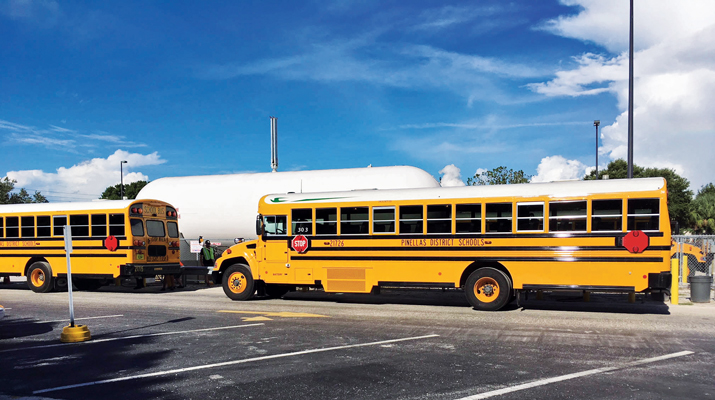Autogas: AmeriGas pursues ‘growth segment’ of the industry
LP Gas Editor-in-Chief Brian Richesson spoke with Brian Grimm, director of national accounts for AmeriGas. Grimm has been with the company for more than 12 years. He works with two national account managers whose primary focus is autogas initiatives. Local field sales representatives and managers also develop autogas opportunities for the company. Here’s a transcript from the interview, edited for length and clarity.
LP Gas: Can you provide background on AmeriGas’ involvement with autogas?
Grimm: About 12 years ago, we decided to go after this [market] from a business development standpoint. We built a small autogas team and really started working with different fleet customers that were current national accounts, and then also engaging with the OEM partners and infrastructure partners. Our initial team now has become more of a management team for autogas because AmeriGas is focused on autogas.
LP Gas: What partners are helping you to make inroads in this market?
Grimm: Roush [CleanTech] is one of the key OEM, industry-type partners as well as International and Blue Bird from the people mover/school bus segment. That’s really the key for autogas – to make sure there are vehicles and options for fleets to purchase. There are also some bi-fuel options out there as well, but our focus primarily has been on the OEM-type programs. Also, [infrastructure is] a key part of what we do for customers. There are a lot of great companies that make solid equipment and quality installations. Typically, what we try to do is help customers that need a turnkey solution.
LP Gas: From a dispenser, refueling infrastructure standpoint, you’re saying?
Grimm: Dispensers, tanks. A lot of the fleets that begin with autogas don’t necessarily need an expansive station to start, but they will over time. We’re often installing six, eight dispenser-type gas stations with a transport size tank or multiple manifold tanks. So, we need support from our equipment partners – not just producing quality equipment but also helping with building a quality station for the fleet operator. These are typically private sites. The customer has a fleet center, and they need a station for their drivers.
LP Gas: Are school buses No. 1, or do you have other key end-user segments?
Grimm: The key segment for us is the people mover segment, so that is schools and also transit. Those are the two areas that we have had a lot of success with. Secondary to that is delivery vehicles that are domiciled fleet operations – customers like UPS or Nestlé Waters.

AmeriGas is seeing the fastest growth in the people mover segment of the autogas market, including school buses and public transit. (Photo by Brian Grimm)
LP Gas: So, you are seeing growth in this market?
Grimm: Oh yeah. This market is really something that we feel strongly about – not only because of our own internal ESG (environmental, social, governance) goals and our commitment to the environment but also because it is one of the fastest-growing segments. It’s growth with current customers; once they try propane as an option for replacing traditional fuels – and this is primarily a diesel replacement opportunity – those customers will almost never stay with that current buy. So, it’s a growth segment for us with current customers but also new customers. Just with our customers, we’re well over 5,000 vehicles that are running on propane.
LP Gas: How do you make inroads when you’re talking to customers or prospective customers?
Grimm: Most fleets, of any size, have goals like we do – starting with ESG, environment, emissions. That’s where the messaging usually starts. The beauty of propane is this fuel doesn’t need incentives to make sense economically as well. That’s really what the fleet operators are charged with – “We want to cut emissions, but also we want to make sure this is an economic benefit to the school or to the transit company.”
LP Gas: Are you doing any work in the renewable propane space?
Grimm: Our customers are interested in that. We do talk to them about that because we are engaged in a project for renewable. It’s important for the industry too. To make sure for the next 10 years that propane autogas continues to accelerate and grow, I think renewable is a part of that. That helps fleets in certain states like California with CARB (California Air Resources Board) and additional restrictions for natural-gas-related type fuels. That gets the fleets a significantly less CI (carbon intensity) score than the electric grid. Renewable is going to continue to allow propane to expand in this fleet/on-road use.
LP Gas: What’s your view on the industry’s own fleet vehicles running on propane? Does AmeriGas have a certain segment running on propane?
Grimm: We have hundreds of service trucks, bobtails that run on propane today. We are planning to continue to expand that. We see the benefits for our fleet. We’re very similar to a lot of our customers. As the vehicle options expand, that creates more opportunity for us to expand our fleet and our use.
LP Gas: What can the industry do to grow the autogas market?
Grimm: The segments that are growing the fastest are schools – every propane company in America can engage with their local school boards to get information to them – and then on the transit side as well. There’s a lot of county transits, a lot of city transits that run vehicles they can order that run on propane today. It’s that local information sharing and engagement that is key for the expansion of propane autogas.

















